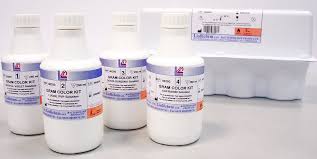Specifications:
| Application | Microbiology | ||
| Storage Temperature | Room Temperature | ||
| Product Type | Biological Stain | Forms | Liquid |
| Product Brand | Liofilchem | ||
| Product Grade | Microbiology grade | ||
Liofilchem® Safranin Solution is a specialized staining reagent used in Gram staining procedures. It provides the critical counterstain step that differentiates Gram-negative bacteria (red-stained) from Gram-positive bacteria (blue-stained). The solution is formulated for consistent and high-quality results in clinical, research, and educational applications.
Key Features
- Purpose: Used as the counterstain in Gram staining to differentiate Gram-negative and Gram-positive bacteria.
- Formulation:
- Safranin Concentration: 0.25%
- Ethyl Alcohol: 20%
- Appearance: Clear red solution.
- Packaging Options:
- 1L Bottle (Code: 80290)
Principle
Gram staining relies on the ability of Crystal Violet to form a complex with iodine, which is retained by Gram-positive bacteria after decolorization. In contrast, Gram-negative bacteria lose the Crystal Violet stain during decolorization and are counterstained with Safranin, giving them a red appearance.
Procedure
Preparation and Fixation:
- Prepare Slide:
- Streak the sample or culture on a clean slide.
- Air-dry the slide and fix the sample by quickly passing it through a flame or using an alternative fixation method.
- Staining:
- Step 1: Cover the slide with Crystal Violet Solution for 1 minute, then rinse with water.
- Step 2: Apply Lugol-PVP Solution for 1 minute, then rinse with water.
- Step 3: Decolorize with Decoloring Solution until no further color is released (30-60 seconds), then rinse with water.
- Step 4: Counterstain with Safranin Solution for 30-60 seconds, then rinse with water.
- Step 5: Dry and observe under a microscope with an immersion objective.
Interpretation of Results
- Gram-negative bacteria: Appear red-stained after counterstaining with Safranin.
- Gram-positive bacteria: Retain the blue stain from Crystal Violet.
- Differentiation aids in:
- Identifying Gram-negative bacilli versus Gram-positive bacilli.
- Identifying Gram-negative cocci versus Gram-positive cocci.
Storage
- Store at 10–25°C away from light.
- Ensure proper sealing to avoid contamination or deterioration.
- Shelf life: 2 years.
Quality Control
Each batch is subjected to rigorous quality control to ensure reliable staining:
- Gram-negative control: Escherichia coli ATCC 25922 (red-stained).
- Gram-positive control: Staphylococcus aureus ATCC 25923 (blue-stained).
Precautions
- Contains potentially hazardous substances—refer to the Safety Data Sheet (SDS).
- For in vitro diagnostic use only.
- Must be handled by trained laboratory personnel using aseptic and safety procedures.
Applications
- Clinical Microbiology: Rapid identification and differentiation of Gram-positive and Gram-negative bacteria in patient samples.
- Research Microbiology: Fundamental staining method for bacterial taxonomy and morphology studies.
- Educational Use: Demonstrates basic microbiological staining techniques in academic settings.
Packaging Information
| Code | Volume | Packaging |
|---|---|---|
| 80290 | 1000 mL | 1 bottle |
References
- Kruczak-Filipov, P., and R.G. Shively. 1992. Clinical Microbiology Procedures Handbook. ASM, Washington, D.C.
- Murray, P.R. (ed.) 1999. Manual of Clinical Microbiology, 7th ed. ASM, Washington, D.C.




 0
0
